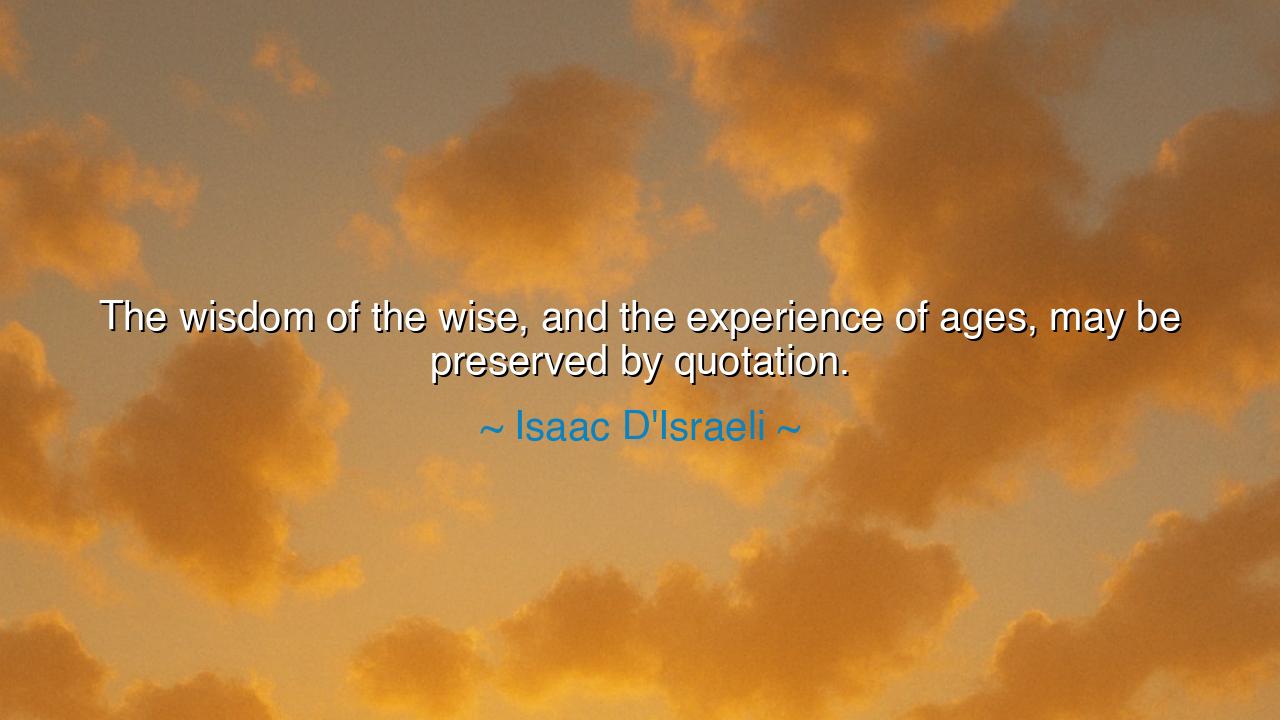
The wisdom of the wise, and the experience of ages, may be






Isaac D’Israeli, lover of letters and father of a prime minister, declares: “The wisdom of the wise, and the experience of ages, may be preserved by quotation.” In these words he unveils a truth about memory and tradition: that human thought, fleeting like the breath, can be caught and preserved in the vessel of words. A quotation is not mere ornament, but a treasury, holding within it the distilled wisdom of the wise and the lessons of generations. By repeating and preserving them, we carry forward the experience of ages so that it may guide those who come after us.
The ancients themselves practiced this sacred art. The proverbs of Solomon, short and shining, were gathered not only to instruct his own people but to echo across millennia. Homer’s verses, sung by bards, were not his alone but the collective memory of a people, preserved by repetition. In every culture, the quotation became a seed—small in form but vast in power—carrying the essence of truth through the storm of time.
History bears witness in the sayings of Confucius. His disciples, gathering his words in the Analects, ensured that his insights into virtue and society outlived his fragile body. Without their preservation, the wisdom of one man would have perished; with their devotion, the thought of a sage became the moral compass of a civilization. Thus D’Israeli’s words ring true: it is through careful quotation that the greatness of the past is woven into the fabric of the future.
D’Israeli also reminds us of humility. To quote another is to confess that truth is larger than ourselves, that we are heirs to treasures we did not create. Each quotation is an act of reverence, a bow before those who saw further, suffered more, or understood deeper. By carrying their voices into our own time, we admit that wisdom is not bound to one age but is the inheritance of all who seek it.
Let the generations remember: to despise quotation is to sever the chain of learning; to honor it is to keep alive the spirit of the great and the noble. For in a phrase well remembered, the dead speak again, the ancient rises to instruct the modern, and the experience of ages becomes a lamp for those who walk today. Treasure quotations, then, not as borrowed words, but as living torches passed from hand to hand, bearing the eternal flame of human wisdom.






Kkienvy0813
This quote encourages reflection on the value of language in capturing human experience. How much of the essence of wisdom can be preserved through a few sentences, and what is inevitably lost in translation? I also question the authority of quotations—do they inherently carry credibility, or should each be critically assessed? It seems that quotations are tools for memory and inspiration, but understanding their full significance requires thoughtful engagement with their origin and context.
HHKhanh Hoa Ha
Reading this quote makes me think about education and learning. Could incorporating quotations into teaching provide students with distilled insights from history’s greatest minds? I also wonder whether this method fosters true understanding or simply memorization. How can educators use quotations to inspire deeper reflection and critical thinking rather than treating them as mere aphorisms? It raises broader questions about the transmission of wisdom across generations.
VATran Thi Van Anh
This statement prompts reflection on the role of tradition and collective memory. Does the preservation of wisdom through quotation ensure continuity of knowledge, or does it risk decontextualization? I’m also curious about which quotations gain prominence and why—are some voices amplified while others are lost? How do social, cultural, and historical factors determine which pieces of wisdom are passed down effectively through quotations?
TNNguyen Thanh Nhan
I find this perspective intriguing because it highlights the mnemonic and cultural function of quotations. Could the practice of quoting others be a way to honor past knowledge while guiding current decisions? It also makes me wonder about the limitations: are some insights too complex or nuanced to be distilled into brief statements? How do we balance the convenience of quotation with the depth of original thought when seeking wisdom?
HDHuy Dinh
Reading this, I’m struck by the notion that quotations act as bridges between generations. How do they preserve not just facts, but the subtle insights of lived experience? I also question whether relying on quotations might discourage deeper engagement with original texts. Can extracting wisdom in snippets ever fully replace the understanding gained from exploring an author’s broader context, or is the quote sufficient to convey essential truths?